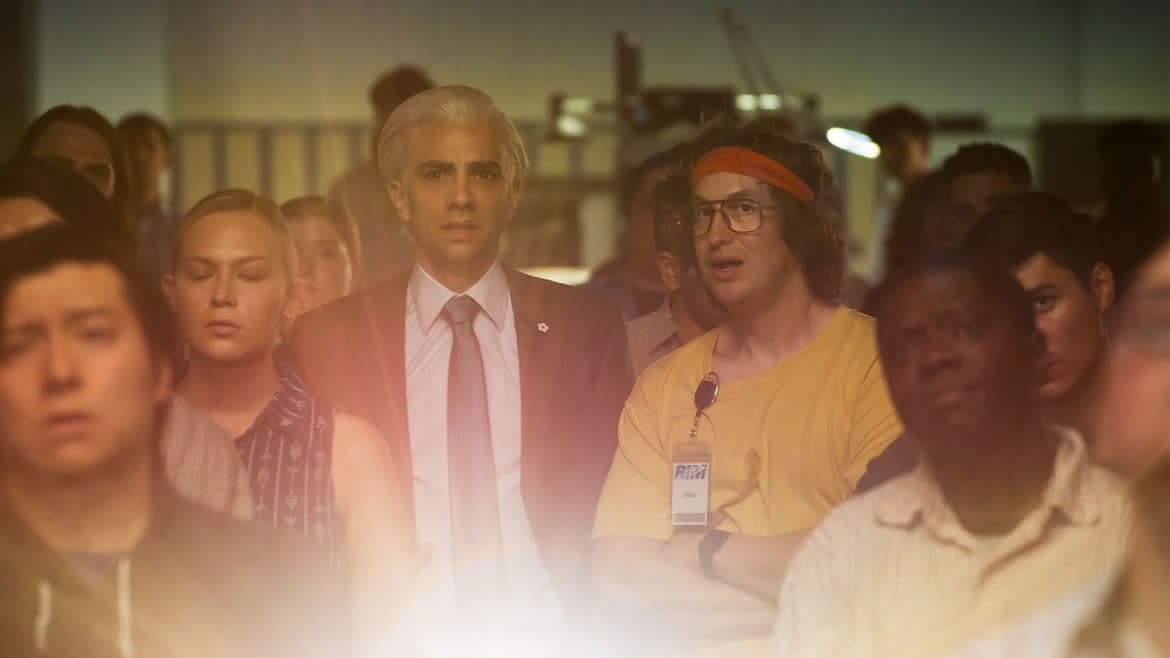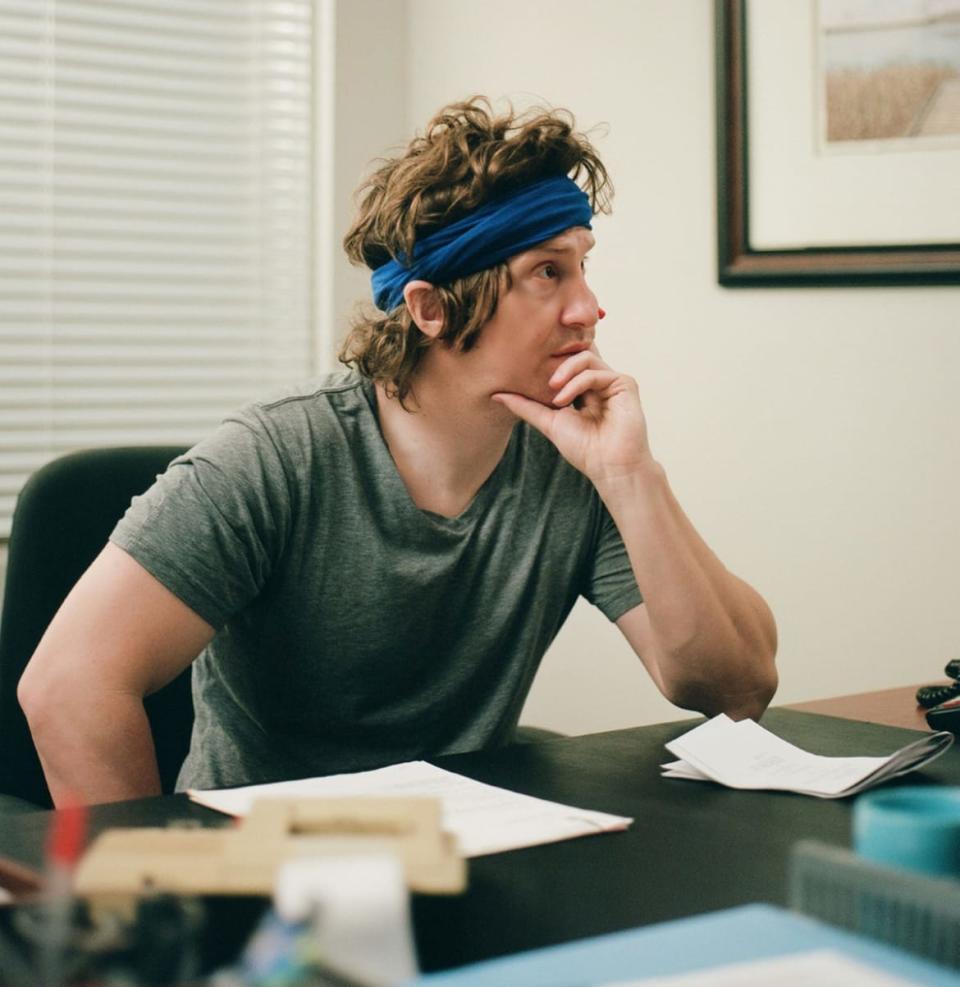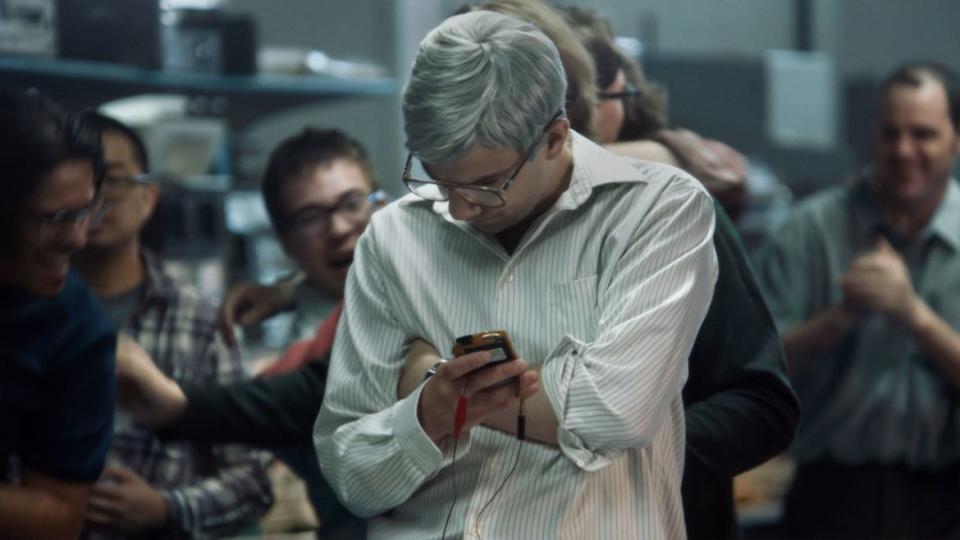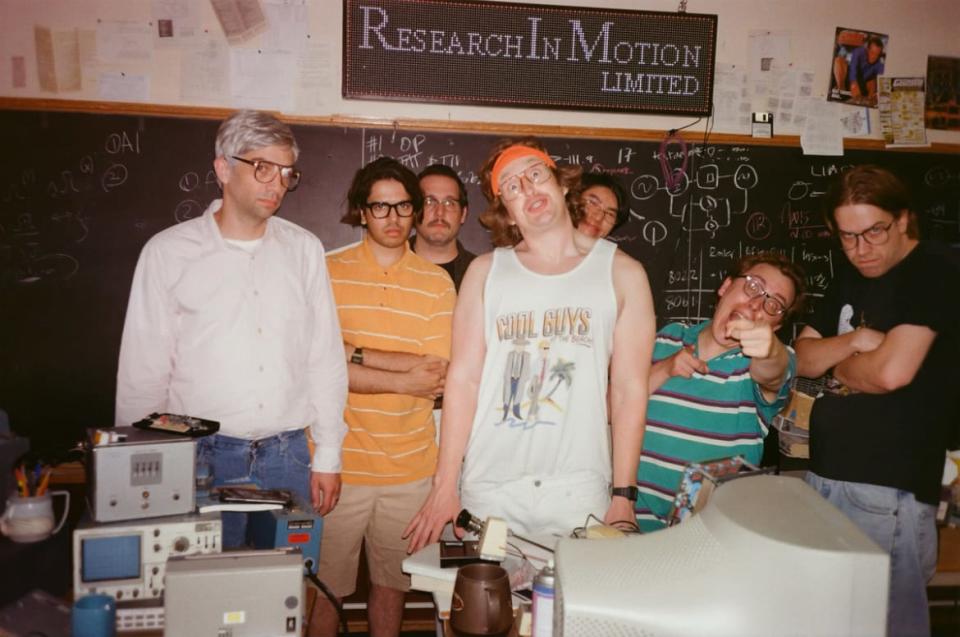The ‘BlackBerry’ Director Had Never Touched a BlackBerry Before

For those familiar with his work—largely in high-concept comedy—Matt Johnson isn’t the obvious choice to direct a film about the BlackBerry, the proto-smartphone you probably remember fiddling with in the mid-2000s. Far from it: Johnson, by his own admission, had never even touched a BlackBerry before working on the new biographical drama.
Instead, what excited him about the story of BlackBerry (now in theaters) was, well, the story: that of the best friends-turned-co-founders of Research In Motion (RIM), who turned the tech industry on its head with their internet-connected cellphone. Once these nerdy Canadians shacked up with the cutthroat businessman Jim Balsillie (Glenn Howerton), however, their low-key quest for success grew into an unwieldy, multi-million-dollar triumph—and then disaster.
Johnson himself plays one of those nerdy Canadians: Doug Fregin, who resisted Balsillie’s promises of exploding BlackBerry’s market share in the name of keeping things low-key. But his bestie—and the real brains of the operation—Mike Lazaridis (Jay Baruchel) couldn’t quite resist the financial temptations.
Thinking about BlackBerry in terms of its characters, not its tech, makes it slightly easier to reconcile Johnson’s placement at the helm. It probably helps that the cult-fave Canuck comic, best known for the uncommonly quirky, very funny, little-seen webseries and CBC/Viceland TV show Nirvanna the Band: The Show, thought of this business drama as emblematic more of life’s absurdity than tragedy. Whatever the case, his third feature film is undoubtedly his best—just check out BlackBerry’s rave reviews, ahead of its May 12 theatrical release.

We chatted with Johnson about whether BlackBerry is meant to make you laugh, cry, or both, as well as how he ended up attached to this project in the first place—and the moving story behind one of its most surprising musical flourishes.
I’m most familiar with your absurd, very silly comedy work, like Nirvanna the Band: The Show. Even the name of that alone is indicative of your work’s very… specific sense of humor. What drew you to the more serious story of BlackBerry’s rise and fall?
It was a little cynical, to be completely honest. As you said, I was making very obscure, cult comedies. That’s my work, and I’ll keep doing that until I’m dead. But I was feeling like my work is so repulsive, in a way, to audiences—it almost intentionally pushes people away. My first film is a comedy about a school shooting, and my second film is about the CIA faking the moon landing… You have to really want to see [these movies] in order to see or get into them.
I thought [that] I wanna make something for once that is inviting to audiences— like a movie about BlackBerry. It just seemed broad enough. That’s also why I called the movie BlackBerry, instead of something interesting. I was very conscious about trying to make something that, on its face, is as boring and accessible as it could seem, before you actually sit down and watch the movie.
The ‘BlackBerry’ Movie Is More Than Just the Next ‘Social Network’
Then, I would get to do some of the things that I love, like [including] the way that me and my friends actually talk and a culture of the ’90s that was really important to me, that I’ve never seen put on screen before. [I wanted] to put in music that I love, that you normally never get to hear in movies. So it was a bit of a Trojan Horse strategy.
That’s a good way to go about it.
What I really loved was the idea of three relatively unknown characters, who really did change the world in a major way and invented all kinds of crazy shit, like double-spacing to make a period and auto-complete when you’re typing somebody's email in. I thought [that] this is just fertile ground for me to do another one of my movies, but in a different skin.
I think that comes across, in that BlackBerry is a character-based drama as much as it’s a company biopic. But there is still a strong focus on the tech itself. How much research did you have to do into the technological aspect?
We did research in two ways. The first one was that I was trying to figure out what this place was really like, because the book that we optioned had Mike and Jim’s participation. It really couldn’t go too deep—they didn’t talk about the culture in a very real way.

But in terms of understanding the technology, I just spoke with Canadian engineers who were there or who worked in similar industries, and they, in very colloquial terms, taught me what the difference between a client and a server-based cellphone was, what the breakthrough that BlackBerry had that made it possible to sit on networks and not use up tons of data, [and] what it was like to actually shrink data on on these devices, and then, later on, what really occurred.
Did you ever own a BlackBerry yourself?
No, I’d never touched a BlackBerry before we made this movie. I am very technophobic in a way—I didn’t have a cellphone [back then]. All of this stuff completely missed me.
But I do love video games and computers, and I grew up in an era where that kind of stuff was so interesting, especially the scrappy side of computer technology. ID Software, which created the video games Doom and Wolfenstein, I was very obsessed with [in the ’90s]. My character, in a lot of ways, is based on John Romero, who is the artistic designer of both Wolfenstein and Doom. I fell in love with that culture more than I did with the technology.
There’s a Nirvanna the Band video that we made, [where] we were watching the Wii Shop [Channel, the games marketplace on the Nintendo Wii console]—it would update every week, and me and Jay would really get into this. We loved it, so we made a video where we sang a song about all the new titles. And that, I think, sums up my feeling around technology. I like to be so naive about it.
I read an interview with Glenn Howerton where he said that he approached Jim as a dramatic anti-hero, a tragic figure—but that, after each take, he’d hear you laughing. Do you consider BlackBerry a drama, a comedy, or both?
Glenn asked me that in person two days ago, and I thought, oh man, this is crazy. He’s seen the movie, like, four times at this point, with big audiences, and so to still be asking… I actually think that it speaks to what I love, which is that I think real life is super funny.
I think that the thing that people get wrong about drama, and one of the reasons that I’m so allergic to most movies, especially melodramatic movies, is that everybody forgets that everyone’s funny. I’ve never met somebody who’s not funny. So to say this is a comedy, or this is not a comedy—you’re falling into a genre trap.
Glenn is playing the movie like his character really does mean what he says and really wants what he wants. He’s not trying to get laughs, but because we as an audience are like, “I can’t believe this guy is serious about this,” it becomes hilarious… It’s just a movie where it’s trying to be real, and in my world, real is always gonna be funny.
Charlie Day Owes Everything to Guillermo del Toro—and Mountain Dew
You mentioned that you wanted to include personal touches within this movie, even though this is a biopic. My favorite of those is your use of the song “Good Morning, Captain,” by the post-hardcore ’90s band Slint in a key scene. It’s a pretty obscure track to get such prominent placement.
Why did you choose to use that song, especially in such a funny way—playing in a New York taxi cab?
There’s two big reasons. The first one is, when I was preparing this movie, I was trying to find the soundtrack. I was driving in a car with a friend, and she was playing all kinds of early ’90s music. We were listening to Tweez, which is Slint’s first album, and that got us thinking that maybe we should put some Spiderland [the band’s second, final record] in this.
You obviously do know the band, but [Slint was] one of these bands that I think could have been [as big as] the Pixies, but they broke up and decided they hate one another. [“Good Morning, Captain”] is, in some ways, a breakup song.
It absolutely is!
BlackBerry is about a friendship ending, in a way. The relationship that my character [Doug] and Mike have… it’s almost like I’m looking out for this guy. I thought that was a more interesting way of showing a breakup, [and that it] would be so interesting to have that guy betray me, because I would never see that coming. I was defending [him]! These themes are all in that song to me—it just seems so thematically resonant with where the film was going to go.
And yes, you are right that it is maybe slightly insane that a taxi cab in New York would be listening to Slint. But, you know, there’s all kinds of interesting cab drivers out there that would be tuned into god-knows-what kind of college radio.
It’s true! One last question: Do you know if the real Mike, Jim, and Doug have seen the movie yet? Have you talked to them?
We haven’t spoken to any of them, but I do know that they have varying degrees of curiosity around it, and they haven’t seen it yet. I’m really looking forward to possibly doing a screening and Q&A with them in Toronto.

I know that Jim has been actively asking about it. His girlfriend had emailed one of the producers, being like, “He read a review, and yes, Jim really does like those songs. He really does love Joy Division. How did you guys know?” So I know that there’s an interest in it [from them].
Your music taste proves on-point.
I think, to be honest, Jim will be quite happy, even though maybe there’s some audiences who think he comes off as brash or cruel. I don't think he’ll see that. I think he’s lionized in a way, and Glenn’s take of him is so kind, and he looks like a movie star.
I can’t predict what they’ll think, because everybody has their own vision of themselves… But I can only hope that they enjoy it, and that they aren’t upset. But even then, I mean, we tried to tell the truth, right?
Keep obsessing! Sign up for the Daily Beast’s Obsessed newsletter and follow us on Facebook, Twitter, Instagram and TikTok.
Get the Daily Beast's biggest scoops and scandals delivered right to your inbox. Sign up now.
Stay informed and gain unlimited access to the Daily Beast's unmatched reporting. Subscribe now.

 Yahoo News
Yahoo News 
